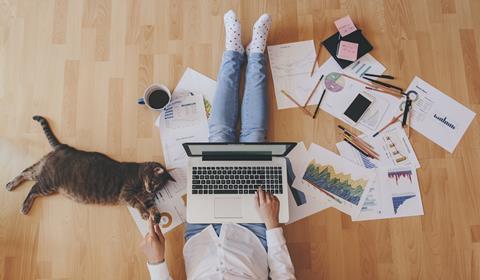In one of his recent podcasts, renowned real estate consultant Antony Slumbers, who coined the term ‘space as a service’ in 2014, described the magnitude of the Covid-19 effect thus: “There will be history books with titles such as ‘The Calamitous Third Week of March 2020’, when (in the UK) Covid-19 launched a tsunami of change across society.”

Many industry figures are now distinguishing real estate before Covid (BC) and after (AC). From the pandemic’s onset, people immediately learned to work and live online. Now, as the lockdown is gradually lifted, they are trying to understand the new normal. Local businesses have had to re-invent themselves overnight. It has become ‘survival of the fittest’, and companies that had already adopted digital communications and could swiftly implement business models to provide for all their stakeholders’ changing needs were the ones left less affected.
Getting the economy going again means getting people back to work, but this is unlikely to happen either fast or easily, given the unprecedented work and lifestyle changes inflicted by Covid-19 and its devastating effect on public health. In a recent newsletter, Dror Poleg, co-chair of the Urban Land Institute’s Technology and Innovation Council in New York, explains why middle managers and landlords who say working from home is unproductive are missing the point. As he says, companies in the world’s gateway cities have been spending at least $15,000 a year to keep an employee at a desk.
“[Company] bosses should not ask: ‘Can my employee work remotely?’ They should ask: ‘If I reallocate $15,000 a year to support an employee’s productivity, could they produce better work without spending every day at the office?’ For millions of employees, the answer is a resounding ‘yes’.”

Companies still need a central home base to attract talent and new business and to catalyse critical thinking and creativity. But they also need the tools to prepare for future disruptions. Making flexible working possible for staff has been one of the most important lessons of the coronavirus crisis, not least given the obvious positive impacts on the environment and many people’s health and wellbeing.
But those working in a flat on an outdated laptop or home schooling with no private space may disagree. A record number of people are furloughed or unemployed with severely reduced incomes. Many are also suffering from depression or loneliness because of lockdown. Domestic abuse has risen sharply.
On the other hand, not everyone will want to go back to commuting one to three hours a day, and it doesn’t make sense for everyone to return to that way of life.
Companies will be put to the test to look after staff and make sure they are well-equipped for potential future crises. Covid-19 has proved that companies need to protect their employees first if they are to thrive in this new normal, while landlords need to help accommodate occupiers’ new needs. Those who hit the snooze button will struggle to compete.
The workplace is always evolving, but Covid-19 is telling us that offices must adapt at a time when innovative thinking and empathy are most imperative.
As Slumbers says: “The office and remote work are friends, not foes. Each needs the other. Our customers still want and need great real estate to work in. We need to rethink what that means, and now is our chance.”
Joanna Turner is head of property research at Canada Life Investments





























No comments yet